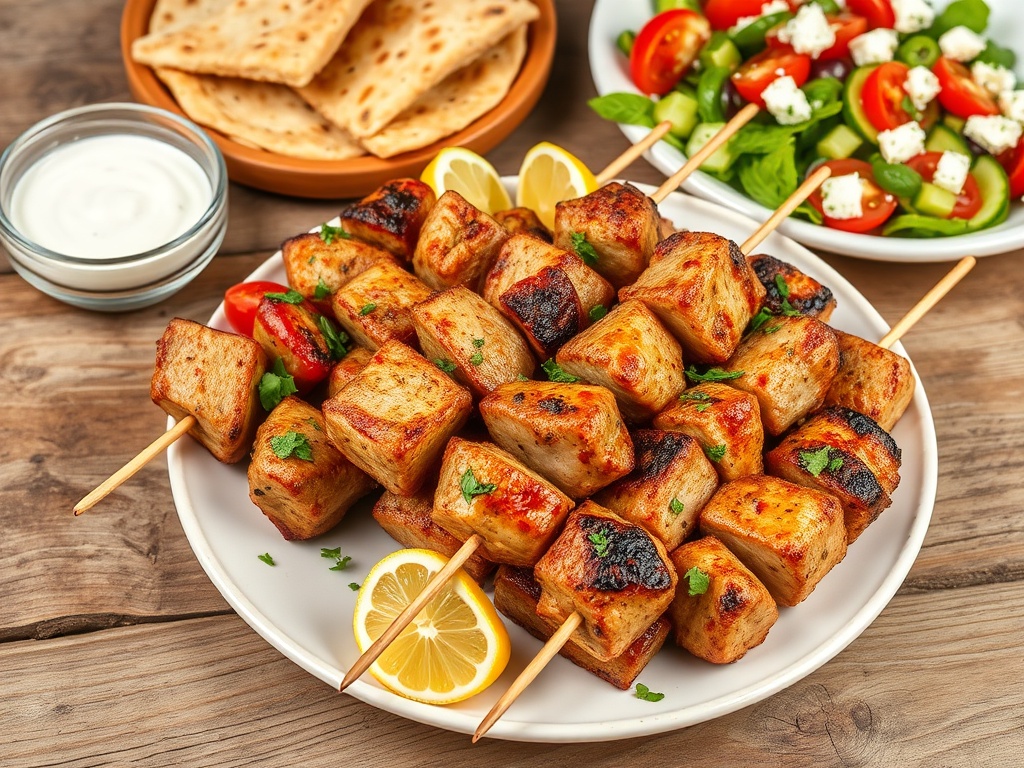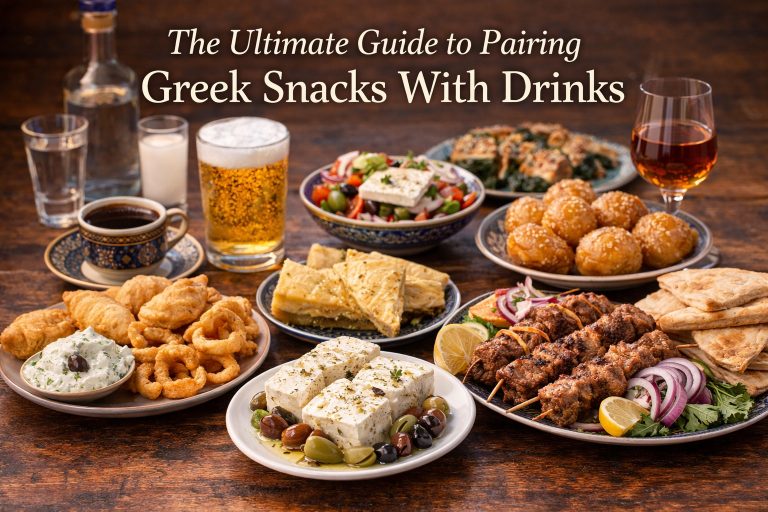
Introduction
Kalamakia, often referred to as “kalamari sticks,” is a beloved dish in Greek cuisine, particularly popular as a meze (appetizer) or street food. These flavorful skewers, typically made with tender pieces of marinated meat, are grilled to perfection, offering a delightful taste of Mediterranean flavors. In this article, we’ll explore the history, preparation, and variations of kalamakia, along with tips for enjoying this delicious dish and its cultural significance in Greece.
History of Kalamakia
The origins of kalamakia can be traced back to traditional Greek cooking methods that emphasize grilling and marinating. The name “kalamaki” comes from the Greek word for “skewer,” reflecting the dish’s method of preparation. Historically, Greeks have always utilized skewers for grilling meat, a practice that dates back to ancient times when outdoor cooking was common.
Kalamakia has evolved into a popular street food, especially in coastal regions where fresh seafood is abundant. Different regions of Greece have their unique takes on kalamakia, incorporating local ingredients and spices that reflect their culinary heritage. The dish is not just a meal; it represents a tradition of communal eating and hospitality, often enjoyed during family gatherings, festivals, or at tavernas by the sea.
Ingredients and Preparation
Basic Ingredients
The essential ingredients for kalamakia typically include:
- Meat: Common choices are pork, chicken, or lamb, cut into bite-sized pieces. The choice of meat can significantly affect the flavor and texture of the dish.
- Marinade: A mixture of olive oil, lemon juice, garlic, oregano, and salt creates a flavorful marinade that tenderizes the meat. This marinade is a hallmark of Greek cooking, highlighting the use of fresh, high-quality ingredients.
- Skewers: Traditionally, wooden or metal skewers are used to hold the marinated meat. Soaking wooden skewers in water beforehand prevents them from burning on the grill.
Preparation Steps
- Marinate the Meat: Combine olive oil, lemon juice, minced garlic, oregano, salt, and pepper in a bowl. Add the meat pieces and mix well to ensure they are evenly coated. Let the meat marinate for at least one hour, preferably overnight for maximum flavor absorption.
- Skewering: Thread the marinated meat onto skewers, leaving a little space between pieces for even cooking. For added flavor, you can alternate pieces of meat with vegetables like bell peppers, onions, or cherry tomatoes.
- Grilling: Preheat a grill or grill pan over medium-high heat. Place the skewers on the grill, cooking for about 10-15 minutes, turning occasionally until the meat is cooked through and has a nice char. The grilling process is crucial as it imparts a smoky flavor that enhances the overall taste.
- Serving: Serve the kalamakia hot, garnished with fresh herbs like parsley or mint and lemon wedges. The acidity of the lemon brightens the dish, making it even more refreshing. They pair wonderfully with tzatziki sauce or a fresh Greek salad.
Variations of Kalamakia
While the classic version of kalamakia is delicious on its own, various regional adaptations and variations exist:
- Seafood Kalamakia: Instead of meat, some regions use shrimp or octopus, marinated in similar flavors and grilled for a unique twist. This variation is especially popular on the islands, where fresh seafood is abundant.
- Vegetable Kalamakia: For a vegetarian option, skewers can be made with bell peppers, zucchini, cherry tomatoes, and mushrooms, marinated and grilled alongside the traditional meats. This option showcases the vibrant produce available in Greece.
- Spicy Kalamakia: Adding chili flakes or spices like paprika to the marinade gives the dish an extra kick, appealing to those who enjoy a bit of heat. This variation can reflect regional preferences, especially in areas where spiciness is more common.
- Herb-Infused Kalamakia: Some recipes incorporate fresh herbs like rosemary or thyme into the marinade, giving the skewers an aromatic twist that elevates their flavor profile.
Cultural Significance
Kalamakia is more than just food; it embodies Greek culture and the importance of sharing meals with family and friends. In Greece, meals are often communal experiences, and kalamakia is a perfect fit for gatherings.
During festivals and celebrations, kalamakia is frequently featured, as it encourages social interaction and enjoyment. Street vendors often sell kalamakia at fairs and markets, making it accessible to everyone. The dish symbolizes Greek hospitality, where sharing food is a way of connecting with others.

Enjoying Kalamakia
Kalamakia is best enjoyed as part of a larger meal. Here are some tips for a delightful dining experience:
- Pairing: Enjoy kalamakia with a glass of ouzo or a light Greek wine. The refreshing flavors of the drink complement the grilled meat beautifully. For a non-alcoholic option, consider serving with a fresh lemonade or a yogurt-based drink.
- Accompaniments: Serve with pita bread, salads, or dips like tzatziki or hummus to enhance the flavors. A simple side of Greek salad, with tomatoes, cucumbers, and feta cheese, makes for a perfect complement.
- Sharing: As a meze, kalamakia is perfect for sharing among friends and family, fostering a sense of community and enjoyment. Consider setting up a platter with various skewers for guests to choose from, creating an interactive dining experience.
- Presentation: Serve the skewers on a large platter, garnished with fresh herbs and lemon slices. A colorful presentation adds to the appeal and enhances the overall dining experience.
Conclusion
Kalamakia is more than just a dish; it’s a celebration of Greek culinary traditions and flavors. Whether enjoyed at a bustling taverna or made at home, these skewers embody the essence of Mediterranean cooking. With their rich history, simple preparation, and myriad variations, kalamakia is a must-try for anyone looking to experience the delights of Greek cuisine.
As you embark on your culinary journey with kalamakia, remember that the heart of the dish lies not only in the ingredients but also in the joy of sharing it with others. So gather your friends and family, fire up the grill, and indulge in the flavors of Greece.



